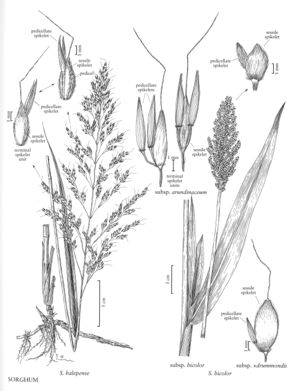familyPoaceae
subfamilyPoaceae subfam. Panicoideae
genusSorghum
speciesSorghum bicolor
subspeciesSorghum bicolor subsp. bicolor
Sorghum bicolor subsp. bicolor
Common names: Sorghum Broomcorn Sorgo
Synonyms: Sorghum vulgare var. technicum Sorghum dochna var. technicum Sorghum undefined var. dochna Sorghum undefined var. caudatum Sorghum caffrorum Sorghum bicolor var. saccharatum Sorghum bicolor var. caffrorum
Treatment appears in FNA Volume 25. Treatment on page 630.
Revision as of 03:23, 30 July 2020 by imported>Volume Importer
Plants annual. Culms to 5 m or more, stout, frequently tillering. Inflorescence branches remaining intact at maturity, with 1-5 nodes. Sessile spikelets 3-9 mm long, 2-5 mm wide, elliptic to oblong. Caryopses exposed at maturity.
Discussion
All the cultivated sorghums are placed in Sorghum bicolor subsp. bicolor. 'Grain sorghums' have short panicles and panicle branches, 'broomcorns' have elongate panicles and panicle branches, and 'sweet sorghums' or 'sorgo' produce an abundance of sweet juice in their stems. For a more detailed treatment, see Harlan and de Wet (1972).
Selected References
None.
Lower Taxa
None.
"decumbent" is not a number.
... more about "Sorghum bicolor subsp. bicolor"
absent +
common +
absent +
bulliform +
absent +
membranous +
absent +
absent +
arising +
single +
hard +
thick +
pseudopetiolate +
well-developed +
adaxial +
glabrous +
reduced +
intact +
1;13 +
spikelike +
single +
blunt +
absent +
exposed +
tillering +
annual +
stout +
climbing +
floating +
decumbent +
not woody +
narrow +
Conn. +, N.J. +, N.Y. +, Wash. +, D.C. +, Wis. +, Ont. +, Que. +, Pacific Islands (Hawaii) +, Fla. +, Wyo. +, Puerto Rico +, N.Mex. +, Mass. +, R.I. +, La. +, Mich. +, Nebr. +, Nev. +, S.Dak. +, N.C. +, N.Dak. +, Tenn. +, Pa. +, Calif. +, Miss. +, Va. +, Colo. +, Md. +, Virgin Islands +, Ala. +, N.H. +, Ark. +, Vt. +, Ill. +, Ga. +, Ind. +, Iowa +, Okla. +, Ariz. +, Idaho +, Maine +, Mont. +, Oreg. +, Tex. +, Ohio +, Utah +, Mo. +, Minn. +, Kans. +, Ky. + and S.C. +
waisted +
large +
hard +
capillary +
sessile +
adjacent +
sometimes longer +
well-developed +
absent +
reduced +
concealing +
bisexual +
absent +
shorter +
shorter or longer +
subtending +
exceeding +
unequal +
equal +
lacking +
uncinate +
punctate +
Present +
photosynthetic +
photosynthetic +
subtending +
solid +
elongated +
glabrous +
winged +
absent +
distichous +
modified +
photosynthetic +
hyaline +
coriaceous +
absent +
membranous +
free +
absent +
inconspicuous +
glabrous +
cuneate +
fleshy +
staminate +
sterile +
reduced +
translucent +
absent +
sessile +
absent +
glabrous +
homomorphic +
homogamous +
pedicellate +
keeled +
contracted +
absent +
pedicellate +
appressed +
fused +
absent +
slender +
separating +
compound +
whorled +
attached +
evident +
elongate +
hyaline +
higher +
open +
closed +
complex +
bisexual +
unisexual +
sessile +
length +
well-developed +
attached +
usually shorter +
absent +
subequal +
variable +
simple +
Sorghum bicolor subsp. bicolor +
Sorghum bicolor +
subspecies +
hyaline +
membranous +
sessile-pedicellate +
heterogamous +
pistillate +
bisexual +
2-keeled +
twisted +
absent +
perennial +
tillering +
annual +
herbaceous +
varied +
